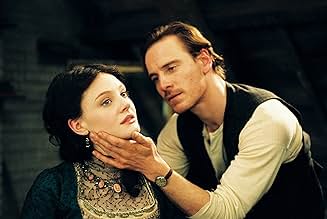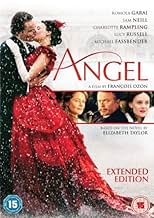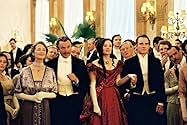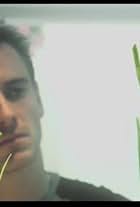IMDb RATING
5.8/10
5.7K
YOUR RATING
The rise and fall of a young eccentric British writer, in the early 20th century.The rise and fall of a young eccentric British writer, in the early 20th century.The rise and fall of a young eccentric British writer, in the early 20th century.
- Awards
- 1 win & 3 nominations total
Geoffrey Streatfeild
- Sebastian
- (as Geoffrey Streatfield)
Featured reviews
It starts quite strangely for a movie about the life of a romantic novel writer in the early XX century Britain, with a wannabe Danny Elfman's music, an ugly pink opening, and an actress obviously too old for the part she plays. But, as the movie goes on, if the strangeness still remains, all this elements begin to make sense and create and original, and I think, never experimented on screen, world. ANGEL is indeed a really good surprise if you manage to accept and enter the inner world that the movie describes, and the kitsch atmosphere of Ozon's style (witch was for me unbearable in his previous movies, like "8 Femmes", but that absolutely fits the subject of this movie). When I learned that Ozon directed a movie in English about a young artist, I was waiting for a sort of kitsch version of ESTER KAHN (the wonderful movie another French director Arnaud Despechin made about a young lady in Britain in the early XX century), but I couldn't be more wrong : ANGEL is a sort of feminine (or Gay) version of Tim Burton's ED WOOD, describing how a strong imagination no matter how bad it is can completely recreates the world, and how you can fully lives in a fantasy universe, when you believe hard enough in your talent and your art .
The movie tells us the life of Angel (Ramola Garai, who has everything to become the new Ludivine Sagner for François Ozon), from her childhood, where she dreams, upstairs the family's grocery, of the fastidious and glamorous life of a famous writer, to her success in the house of her dreams : Paradise house, where she has everything she ever dreamed of when she was young. The originality of this movie is that everything is seen with Angel's eyes. And her eyes only see what her imagination tells them to see, for she doesn't live in reality, but always fills it with dreams, so that she can live as if she were one of her romantic heroine. Whatever awful and sad the word might be, it never touches Angel, for she always transforms it with her imagination the way she wants. And imagination, she has plenty... Of course, her world is a childish, puerile and kitsch world of a bad Barbara Cartland 's novel and the movie completely recreates it on screen, with all the artifices it supposes : from the colors that explains the pink to the situations : when she proposes Esme, the man she chooses to love, the rain suddenly stops when he says yes, and a rainbow appears : empirical reality doesn't exist here, for Angel is unable to see it. But, and here's the all interest of the movie, the spectator, on the other hand, is absolutely able to watch it.
This tension between the strong believing that Angel puts in her world, and the ridiculous that the spectator sometimes sees in it, is mostly tangible thought other character's eyes (like Charlotte Ramplin is the more judgmental, she's the first to condemn Angel's books, but mostly for personal reasons : she can't stand the pretentious and rude young lady with whom her husband is falling in love, or Esme, the untalented painter, who is also one of this ambiguous character, for he accepts his wife universe, but is unable to really find his place in this fictive world). And the movie constantly plays with this two degrees, witch brings humanity, cruelties and sadness to the shinny but unreal world it describes. That's also why this movie is so surprising : we never know exactly where we are : is this a dream, when will it stops, will reality goes after it in the end ? This constant instability regenerates the spectator interest for this movie, and keep it far from the classical costumed movie about the rise and fall of an English women writer it could have been.
That's also why this movie reminds me of Tim Burton's ED WOOD, for, beyond their differences, they both deal with the same thematic of the triumph of an artistic imagination over the world, and the fall that fallows this triumph, and they also share a melancholic tone, as well as real understanding and compassion for untalented but passionate artists.
The movie tells us the life of Angel (Ramola Garai, who has everything to become the new Ludivine Sagner for François Ozon), from her childhood, where she dreams, upstairs the family's grocery, of the fastidious and glamorous life of a famous writer, to her success in the house of her dreams : Paradise house, where she has everything she ever dreamed of when she was young. The originality of this movie is that everything is seen with Angel's eyes. And her eyes only see what her imagination tells them to see, for she doesn't live in reality, but always fills it with dreams, so that she can live as if she were one of her romantic heroine. Whatever awful and sad the word might be, it never touches Angel, for she always transforms it with her imagination the way she wants. And imagination, she has plenty... Of course, her world is a childish, puerile and kitsch world of a bad Barbara Cartland 's novel and the movie completely recreates it on screen, with all the artifices it supposes : from the colors that explains the pink to the situations : when she proposes Esme, the man she chooses to love, the rain suddenly stops when he says yes, and a rainbow appears : empirical reality doesn't exist here, for Angel is unable to see it. But, and here's the all interest of the movie, the spectator, on the other hand, is absolutely able to watch it.
This tension between the strong believing that Angel puts in her world, and the ridiculous that the spectator sometimes sees in it, is mostly tangible thought other character's eyes (like Charlotte Ramplin is the more judgmental, she's the first to condemn Angel's books, but mostly for personal reasons : she can't stand the pretentious and rude young lady with whom her husband is falling in love, or Esme, the untalented painter, who is also one of this ambiguous character, for he accepts his wife universe, but is unable to really find his place in this fictive world). And the movie constantly plays with this two degrees, witch brings humanity, cruelties and sadness to the shinny but unreal world it describes. That's also why this movie is so surprising : we never know exactly where we are : is this a dream, when will it stops, will reality goes after it in the end ? This constant instability regenerates the spectator interest for this movie, and keep it far from the classical costumed movie about the rise and fall of an English women writer it could have been.
That's also why this movie reminds me of Tim Burton's ED WOOD, for, beyond their differences, they both deal with the same thematic of the triumph of an artistic imagination over the world, and the fall that fallows this triumph, and they also share a melancholic tone, as well as real understanding and compassion for untalented but passionate artists.
Based on the novel by Elizabeth Taylor, this Francois Ozon directed movie was the closing film of the Berlin Film Festival last year, and while it played out like a biography of a fictional character, you can't help but to imagine how close it seemed to the flamboyance of the other Liz Taylor being infused into the titular character.
Movies based on biographies, such as Miss Potter with Rene Zellweger and La Vie En Rose with Marion Cotillard, seem to follow a formula of rags to riches, and basically living the dream that no one had imagined was possible. Naturally, being blessed with a talent and a gift helps too, and with Angel Deverell (Romola Garai), hers was a steely resolve of wanting to break out of her poverty cycle through her writing, an aspiring novelist with limited life experience, relying solely on her vivid imagination to paint literary marvels with her firm grasp of language, constructing sentences like a wordsmith many times her age.
What made her character compelling to watch and follow, is her living in a fantasy world she constructs for herself, which suits her perfectly as it provides for and fuels her imagination with romantic stories to enchant and endear herself to her readers. It shields her from her insecurities, but in doing so, she slowly isolates herself into her view of Paradise, and becomes a chronic liar, which I felt she's constantly aware of, but is ashamed to admit any stain in the perfect world.
Delivered in two distinct acts, things start to change when she meets the Howe-Nevisons. Nora (Lucy Russell), probably her #1 fan who simply worships the ground she treads on, and offers to be her personal assistant, and her brother Esme (Michael Fassbender from 300 who said they'll fight in the shade!), with whom Angel falls head over heels for. And this stifling relationship takes a toil on all parties involved, with shades of possible lesbianism played down in the film (though I'm unsure what became of it in the novel). While Angel had her break from Theo (Sam Neill) the publisher who believed in her, Esme the aspiring painter has none, besides Angel who would probably say Yes to anything he says. And his portrait of her probably was the highlight for me in the movie. If a portrait painter needs to, and can peer directly into your innermost soul and bring whatever qualities he sees in you onto the canvas, then Esme would have succeeded with his god-ugly picture of Angel, reinforces meaning of being beautiful on the outside. but ugly on the inside.
The special effects were quite badly done, and perhaps deliberately too, as it's made up of very obviously superimposed shots of backgrounds that no longer exist because of modernization. Other than that, the rest of the production values are high, and the costumes too which Angel decked herself in, are quite a sight to behold, especially when there's a call for a change in colours to reflect the mood of the story as it wore on.
But what made this movie very palatable, is how Romola Garai carried the role through the story. You can just about believe the very naiveness and devil may care attitude that her Angel brings, however always seemingly able to hide and bury her true feelings deep within herself, and being a master manipulator also helped loads. Like how Charlotte Rampling's character of the publisher's wife reflected, you just can't help but to pity Angel, despite her pomp, flamboyance and hypocrisy.
So if you're interesting in a movie that provides avenue for an intriguing study of a person putting on a very fake mask, then Angel, despite its title, will be the movie for you to examine human traits which are anything but angelic.
Movies based on biographies, such as Miss Potter with Rene Zellweger and La Vie En Rose with Marion Cotillard, seem to follow a formula of rags to riches, and basically living the dream that no one had imagined was possible. Naturally, being blessed with a talent and a gift helps too, and with Angel Deverell (Romola Garai), hers was a steely resolve of wanting to break out of her poverty cycle through her writing, an aspiring novelist with limited life experience, relying solely on her vivid imagination to paint literary marvels with her firm grasp of language, constructing sentences like a wordsmith many times her age.
What made her character compelling to watch and follow, is her living in a fantasy world she constructs for herself, which suits her perfectly as it provides for and fuels her imagination with romantic stories to enchant and endear herself to her readers. It shields her from her insecurities, but in doing so, she slowly isolates herself into her view of Paradise, and becomes a chronic liar, which I felt she's constantly aware of, but is ashamed to admit any stain in the perfect world.
Delivered in two distinct acts, things start to change when she meets the Howe-Nevisons. Nora (Lucy Russell), probably her #1 fan who simply worships the ground she treads on, and offers to be her personal assistant, and her brother Esme (Michael Fassbender from 300 who said they'll fight in the shade!), with whom Angel falls head over heels for. And this stifling relationship takes a toil on all parties involved, with shades of possible lesbianism played down in the film (though I'm unsure what became of it in the novel). While Angel had her break from Theo (Sam Neill) the publisher who believed in her, Esme the aspiring painter has none, besides Angel who would probably say Yes to anything he says. And his portrait of her probably was the highlight for me in the movie. If a portrait painter needs to, and can peer directly into your innermost soul and bring whatever qualities he sees in you onto the canvas, then Esme would have succeeded with his god-ugly picture of Angel, reinforces meaning of being beautiful on the outside. but ugly on the inside.
The special effects were quite badly done, and perhaps deliberately too, as it's made up of very obviously superimposed shots of backgrounds that no longer exist because of modernization. Other than that, the rest of the production values are high, and the costumes too which Angel decked herself in, are quite a sight to behold, especially when there's a call for a change in colours to reflect the mood of the story as it wore on.
But what made this movie very palatable, is how Romola Garai carried the role through the story. You can just about believe the very naiveness and devil may care attitude that her Angel brings, however always seemingly able to hide and bury her true feelings deep within herself, and being a master manipulator also helped loads. Like how Charlotte Rampling's character of the publisher's wife reflected, you just can't help but to pity Angel, despite her pomp, flamboyance and hypocrisy.
So if you're interesting in a movie that provides avenue for an intriguing study of a person putting on a very fake mask, then Angel, despite its title, will be the movie for you to examine human traits which are anything but angelic.
If I had approached this movie as a satire, perhaps it would have been more bearable. Or maybe not. It somewhat feels like a play on 40's-50's movie comedy, but set in the early 1900's. The script (and the acting for that matter) is so flawed, there is no need to even bother going over its flaws. Fassbender clearly lives in the 21st century and Romola is straight out of an overacted tragicomedy play from the 1800's, except she is behaving like a bratty teenager we see on Sweet 16. I hope she was doing it on purpose, otherwise there are no excuses for her annoyance. There is a fine line between funny and annoying. I had to force myself to finish watching this movie just because I am such a huge Fassbender fan. Him, along with Charlotte and Sam, what a waste of talent.
My advice would be don't waste your time with this film.
Large chunks were clearly meant to be ironic but much was also meant to be more darkly realistic. The result was a wildly veering mish-mash of genres which the director failed to navigate successfully.
Overall, the film felt like a mix between a 1940s melodrama and a 1970s made-for-TV two-part series, with a loathsome central character.
Two people in our group of 20 loved the film, so it must have something going for it. The rest of us were desperate for it to be over from about 20 minutes in. At one point, the main character gets sick, and from behind me and beside me I heard simultaneous mutters of "please die" and "thank god". That was exactly how I felt.
I am sure the film was making all kinds of comments about art, literature, characterization etc etc but it all went sailing over my head. Driving home, I said as much to my flatmate, and he paraphrased Bill Hicks to me: "The film was bad. Don't get suckered into believing it actually saying something complex and clever. It was bad. Leave it at that and walk away".
Large chunks were clearly meant to be ironic but much was also meant to be more darkly realistic. The result was a wildly veering mish-mash of genres which the director failed to navigate successfully.
Overall, the film felt like a mix between a 1940s melodrama and a 1970s made-for-TV two-part series, with a loathsome central character.
Two people in our group of 20 loved the film, so it must have something going for it. The rest of us were desperate for it to be over from about 20 minutes in. At one point, the main character gets sick, and from behind me and beside me I heard simultaneous mutters of "please die" and "thank god". That was exactly how I felt.
I am sure the film was making all kinds of comments about art, literature, characterization etc etc but it all went sailing over my head. Driving home, I said as much to my flatmate, and he paraphrased Bill Hicks to me: "The film was bad. Don't get suckered into believing it actually saying something complex and clever. It was bad. Leave it at that and walk away".
I'm a great admirer of Francois Ozon's French movies (Swimming Pool, Under the Sand, 8 Women) but this, his first foray into English language drama, is a stinker. Adapted from a book by Elizabeth Taylor about an Edwardian novelist whose life fails to live up to her romantic fantasies it is as ridiculous, clichéd and overwritten as any of the heroine's creations; hard to know if this is the fault of the source material or Ozon's adaptation (though he has been assisted by acclaimed playwright and translator Martin Crimp). You watch it in disbelief, unsure if you're meant to laugh or not, faintly hoping that this is a deliberate attempt at post-modern ironic detachment (but wondering what would be the point) and gradually realising that Ozon thinks he is Douglas Sirk and has completely embarrassed himself.
The actors look all at sea, particularly Romola Garai who can't give any charm to the unlikeable heroine, and Ozon adopts a stiff and old-fashioned style of film-making - complete with syrupy music and terrible back projections - which make the film look as it it was made in 1936 rather than 2006; I'd like to think this was a deliberate if unfortunate miscalculation but the consequence is that the finished product looks stilted and amateurish. Only Charlotte Rampling - Ozon's muse - almost saves the day, but her air of sardonic detachment probably says more about her feelings towards the film than about her character.
The actors look all at sea, particularly Romola Garai who can't give any charm to the unlikeable heroine, and Ozon adopts a stiff and old-fashioned style of film-making - complete with syrupy music and terrible back projections - which make the film look as it it was made in 1936 rather than 2006; I'd like to think this was a deliberate if unfortunate miscalculation but the consequence is that the finished product looks stilted and amateurish. Only Charlotte Rampling - Ozon's muse - almost saves the day, but her air of sardonic detachment probably says more about her feelings towards the film than about her character.
Storyline
Did you know
- TriviaThe story is inspired by the life of Marie Corelli.
- Quotes
Angel Deverell: [from trailer] Everyone told me my dreams were lies. All I wanted was to make it true.
- ConnectionsReferenced in The New Girlfriend (2014)
- How long is Angel?Powered by Alexa
Details
- Release date
- Countries of origin
- Official sites
- Language
- Also known as
- Paradise
- Filming locations
- Production companies
- See more company credits at IMDbPro
Box office
- Budget
- €14,900,000 (estimated)
- Gross worldwide
- $2,835,903
- Runtime2 hours 14 minutes
- Color
- Sound mix
- Aspect ratio
- 1.85 : 1
Contribute to this page
Suggest an edit or add missing content




































